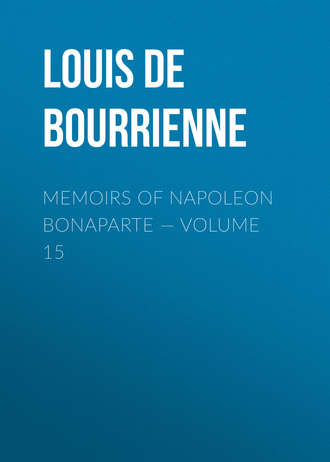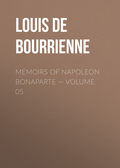
Louis de Bourrienne
Memoirs of Napoleon Bonaparte — Volume 15
Such was the result of my visit to Blucher; but, in spite of his promises, his troops continued to commit the most revolting excesses. Thus the Prussian troops have left in the neighbourhood of Paris recollections no less odious than those produced by the conduct of Davoust's corps in Prussia.—Of this an instance now occurs to my memory, which I will relate here. In the spring of 1816, as I was going to Chevreuse, I stopped at the Petit Bicetre to water my horse. I seated myself for a few minutes near the door of the inn, and a large dog belonging to the innkeeper began to bark and growl at me. His master, a respectable-looking old man, exclaimed, "Be quiet, Blucher!"—"How came you to give your dog that name?" said I.—"Ah, sir! it is the name of a villain who did a great deal of mischief here last year. There is my house; they have left scarcely anything but the four walls. They said they came for our good; but let them come back again . . . . we will watch them, and spear them like wild boars in the wood." The poor man's house certainly exhibited traces of the most atrocious violence, and he shed tears as he related to me his disasters.
Before the King departed for Ghent he had consented to sign the contract of marriage between one of my daughters and M. Massieu de Clerval, though the latter was at that time only a lieutenant in the navy. The day appointed for the signature of the contract happened to be Sunday, the 19th of March, and it may well be imagined that in the critical circumstances in which we then stood, a matter of so little importance could scarcely be thought about. In July I renewed my request to his Majesty; which gave rise to serious discussions in the Council of Ceremonies. Lest any deviation from the laws of rigid etiquette should commit the fate of the monarchy, it was determined that the marriage contract of a lieutenant in the navy could be signed only at the petty levee. However, his Majesty, recollecting the promise he had given me, decided that the signature should be given at the grand levee. Though all this may appear exceedingly ludicrous, yet I must confess that the triumph over etiquette was very gratifying to me.
A short time after the King appointed me a Councillor of State; a title which I had held under Bonaparte ever since his installation at the Tuileries, though I had never fulfilled the functions of the office. In the month of August; the King having resolved to convoke a new Chamber of Deputies, I was appointed President of the Electoral College of the department of the Yonne. As soon as I was informed of my nomination I waited on M. de Talleyrand for my instructions, but he told me that, in conformity with the King's intentions, I was to receive my orders from the Minister of Police. I observed to M. de Talleyrand that I must decline seeing Fouche, on account of the situation in which we stood with reference to each other. "Go to him, go to him," said M. de Talleyrand, "and be assured Fouche will say to you nothing on the subject."
I felt great repugnance to see Fouche, and consequently I went to him quite against my inclination. I naturally expected a very cold reception. What had passed between us rendered our interview exceedingly delicate. I called on Fouche at nine in the morning, and found him alone, and walking in his garden. He received me as a man might be expected to receive an intimate friend whom he had not seen for a long time. On reflection I was not very much surprised at this, for I was well aware that Fouche could make his hatred yield to calculation. He said not a word about his arrest, and it may well be supposed that I did not seek to turn the conversation on that subject. I asked him whether he had any information to give me respecting the elections of the Yonne. "None at all," said he; "get yourself nominated if you can, only use your endeavours to exclude General Desfouinaux. Anything else is a matter of indifference to me."—"What is your objection to Desfournaux?"—"The Ministry will not have him."
I was about to depart when Fouche; called me back saying, "Why are you in such haste? Cannot you stay a few minutes longer?" He then began to speak of the first return of the Bourbons, and asked me how I could so easily bring myself to act in their favour. He then entered into details respecting the Royal Family which I conceive it to be my duty to pass over in silence: It may be added, however, that the conversation lasted a long time, and to say the least of it, was by no means in favour of "divine right."
I conceived it to be my duty to make the King acquainted with this conversation, and as there was now no Comte de Blacas to keep truth and good advice from his Majesty's ear, I was; on my first solicitation, immediately admitted to, the Royal cabinet. I cautiously suppressed the most startling details, for, had I literally reported what Fouche said, Louis XVIII. could not possibly have given credit to it. The King thanked me for my communication, and I could perceive he was convinced that by longer retaining Fouche in office he would become the victim of the Minister who had been so scandalously forced upon him on the 7th of July. The disgrace of the Duke of Otranto speedily followed, and I had the satisfaction of having contributed to repair one of the evils with which the Duke of Wellington visited France.
Fouche was so evidently a traitor to the cause he feigned to serve, and Bonaparte was so convinced of this,—that during the Hundred Days, when the Ministers of the King at Ghent were enumerated in the presence of Napoleon, some one said, "But where is the Minister of the Police?"
"E-h! Parbleu," said Bonaparte, "that is Fouche?" It was not the same with Carnot, in spite of the indelible stain of his vote: if he had served the King, his Majesty could have depended on him, but nothing could shake the firmness of his principles in favour of liberty. I learned, from a person who had the opportunity of being well informed, that he would not accept the post of Minister of the Interior which was offered to him at the commencement of the Hundred Days until he had a conversation with Bonaparte, to ascertain whether he had changed his principles. Carnot placed faith in the fair promises of Napoleon, who deceived him, as he had deceived others.
Soon after my audience with the King I set off to discharge my duties in the department of the Yonne, and I obtained the honour of being elected to represent my countrymen in the Chamber of Deputies. My colleague was M. Raudot, a man who, in very trying circumstances, had given proofs of courage by boldly manifesting his attachment to the King's Government. The following are the facts which I learned in connection with this episode, and which I circulated as speedily as possible among the electors of whom I had the honour to be President. Bonaparte, on his way from Lyons to Paris, after his landing at the gulf of Juan, stopped at Avalon, and immediately sent for the mayor, M. Raudot. He instantly obeyed the summons. On coming into Napoleon's presence he said, "What do you want, General? "This appellation displeased Napoleon, who nevertheless put several questions to M. Raudot, who was willing to oblige him as a traveller, but not to serve him as an Emperor. Napoleon having given him some orders, this worthy servant of the King replied, "General, I can receive no orders from you, for I acknowledge no sovereign but the King, to whom I have sworn allegiance." Napoleon then directed M. Raudot, in a tone of severity, to withdraw, and I need not add that it was not long before he was dismissed from the mayoralty of Avalon.
The elections of the Yonne being over, I returned to Paris, where I took part in public affairs only as an amateur, while waiting for the opening of the session. I was deeply grieved to see the Government resort to measures of severity to punish faults which it would have been better policy to attribute only to the unfortunate circumstances of the times. No consideration can ever make me cease to regret the memory of Ney, who was the victim of the influence of foreigners. Their object, as Blucher intimated to me at St. Cloud, was to disable France from engaging in war for a long time to come, and they hoped to effect that object by stirring up between the Royal Government and the army of the Loire that spirit of discord which the sacrifice of Ney could not fail to produce. I have no positive proofs of the fact, but in my opinion Ney's life was a pledge of gratitude which Fouche thought he must offer to the foreign influence which had made him Minister.
About this time I learned a fact which will create no surprise, as it affords another proof of the chivalrous disinterestedness of Macdonald's character. When in 1815 several Marshals claimed from the Allied powers their endowments in foreign countries, Madame Moreau, to whom the King had given the honorary title of 'Madame la Marechale', and who was the friend of the Duke of Tarentum, wrote, without Macdonald's knowledge, to M. de Blacas; our ambassador at Naples, begging him to endeavour to preserve for the Marshal the endowment which had been given him in the Kingdom of Naples. As soon as Macdonald was informed of this circumstance he waited upon Madame Moreau, thanked her for her kind intentions, but at the same time informed her that he should disavow all knowledge of her letter, as the request it contained was entirely averse to his principles. The Marshal did, in fact, write the following letter to M. de Blacas:—"I hasten to inform you, sir, that it was not with my consent that Madame Moreau wrote to you, and I beg you will take no step that might expose me to a refusal. The King of Naples owes me no recompense for having beaten his army, revolutionised his kingdom, and forced him to retire to Sicily." Such conduct was well worthy of the man who was the last to forsake Napoleon in, 1814, and the first to rejoin him, and that without the desire of accepting any appointment in 1815. M. de Blacas, who was himself much surprised at Macdonald's letter, communicated it to the King of Naples, whose answer deserves to be recorded. It was as follows:—"If I had not imposed a law upon myself to acknowledge none of the French endowments, the conduct of Marshal Macdonald would have induced me to make an exception in his favour." It is gratifying to see princes such scrupulous observers of the laws they make for themselves!
About the end of August 1815, as I was walking on the Boulevard des Capucines, I had the pleasure of meeting Rapp, whom I had not seen for a long time. He had just come out of the house of Lagrenee, the artist, who was painting his portrait. I was on foot, and Rapp's carriage was waiting, so we both stepped into it, and set off to take a drive in the Bois de Boulogne. We had a great deal to say to each other, for we had not met since the great events of the two Restorations. The reason of this was, that in 1814 I passed a part of the year at Sens, and since the occurrences of March 1815 Rapp himself had been absent from Paris. I found him perfectly resigned to his change of condition, though indulging in a few oaths against the foreigners. Rapp was not one of those, generals who betrayed the King on the 20th of March. He told me that he remained at the head of the division which he commanded at Ecouen, under the orders of the Due de Berry, and that he did not resign it to the War Minister until after the King's departure. "How did Napoleon receive you?" I inquired. "I waited till he sent for me. You know what sort of fellow I am: I know nothing about politics; not I. I had sworn fidelity to the King. I know my duty, and I would have fought against the Emperor."—"Indeed!"—"Yes, certainly I would, and I told him so myself."—"How! did you venture so far?"—"To be sure. I told him that my resolution was definite. 'Pshaw! . . . replied he angrily. 'I knew well that you were opposed to me. If we had come to an action I should have sought you out on the field of battle. I would have shown you the Medusa's head. Would you have dared to fire on me?'—'Without doubt,' I replied. `Ah! parbleu this is too much,' he said. 'But your troops would not have obeyed you. They had preserved all their affection for me.'—'What could I do?' resumed I. 'You abdicated, you left France, you recommended us to serve the King—and then you return! Besides; I tell you frankly, I do not augur well of what will happen. We shall have war again. France has had enough of that.' Upon this," continued Rapp, "he assured me that he had other thoughts; that he had no further desire for war; that he wished to govern in peace, and devote himself solely to the happiness of his people. When I hinted opposition on the part of the Foreign Powers, he said that he had made alliances. He then spoke to me of the King, and I said I had been much pleased with him; indeed, the King gave me a very gratifying reception on my return from Kiow, and I see no reason why I should complain, when I am so well used. During the conversation the Emperor much extolled the conduct of the Duke of Orleans. He then gave me some description of his passage from the Isle of Elba and his journey to Paris. He complained of being accused of ambition; and observing that I looked astonished and doubtful—`What?' he continued, 'am I ambitious then?' And patting his belly with both his hands, 'Can a man,' he asked, 'so fat as I am be ambitious?' I could not for my soul help saying, 'Ah! Sire, your Majesty is surely joking.' He pretended, however, to be serious, and after a few moments, noticing my decorations, he began to banter me about the Cross of St. Louis and the Cross of the Lily, which I still wore."
I asked Rapp whether all was true that had been said about the enthusiasm which was manifested along the whole of Napoleon's route from the Gulf of Juan to Paris. "Ma foe!" he replied, "I was not there any more than you, but all those who accompanied him have assured me of the truth of the details which have been published; but I recollect having heard Bertrand say that on one occasion he was fearful for the safety of the Emperor, in case any assassin should have presented himself. At Fossard, where the Emperor stopped to breakfast on his way to Paris, his escort was so fatigued as to be unable to follow, so that he was for some time almost alone on the road, until a squadron which was in garrison at Melun met him and escorted him to Fontainebleau. As to anything else, from all I have heard, the Emperor was exposed to no danger."
We then began to talk of our situation, and the singular chances of our fortune. Rapp told me how, within a few days only, he had ceased to be one of the discontented; for the condition of the generals who had commanded army corps in the campaign of Waterloo was very different in 1815 from what it had been in 1814. "I had determined," he said, "to live a quiet life, to meddle with nothing, and not even to wear my uniform. I had, therefore, since the King's return never presented myself at Court; when, a week ago, while riding on horseback two or three hundred paces from this spot, I saw a group of horsemen on the other side of the avenue, one of whom galloped towards me. I immediately recognised the Duc de Berry, 'How, Monseigneur, is it you?' I exclaimed. 'It is, my dear General; and since you will not come to us, I must come to you. Will you breakfast with me tomorrow morning?'—'Ma foi!" continued Rapp, "what could I do? The tone of kindness in which he gave this invitation quite charmed me. I went, and I was treated so well that I shall go again. But I will ask for nothing: I only want these Prussians and English rascals out of the way! "I complimented Rapp on his conduct, and told him that it was impossible that so loyal and honest a man as he should not, at some time or other, attract the King's notice. I had the happiness to see this prediction accomplished. Since that time I regularly saw Rapp whenever we both happened to be in Paris, which was pretty often.
I have already mentioned that in the month of August the King named me Councillor of State. On the 19th of the following month I was appointed Minister of State and member of the Privy Council. I may close these volumes by relating a circumstance very flattering to me, and connected with the last-mentioned nomination. The King had directed M. de Talleyrand to present to him, in his official character of President of the Council of Ministers, a list of the persons who might be deemed suitable as members of the Privy Council. The King having read the list, said to his Minister, "But, M. de Talleyrand, I do not see here the names of two of our best friends, Bourrienne and Alexis de Noailles."—" Sire, I thought their nomination would seem more flattering in coming directly from your Majesty." The King then added my name to the list, and afterwards that of the Comte Alexis de Noailles, so that both our names are written in Louis XVIII.'s own hand in the original Ordinance.
I have now brought to a conclusion my narrative of the extraordinary events in which I have taken part, either as a spectator or an actor, during the course of a strangely diversified life, of which nothing now remains but recollections.
—[I discharged the functions of Councillor of State until 1818, at which time an Ordinance appeared declaring those functions Incompatible with the title of Minister of State—Bourrienne.]—







